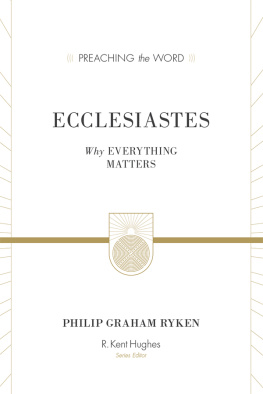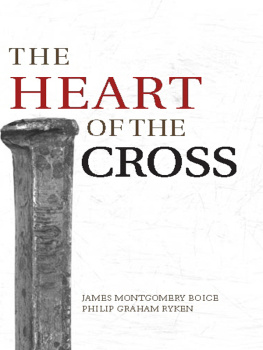Table of Contents
Landmarks
To everyone who has ever prayed for me when I was in trouble,
and to my gracious Lord, Jesus Christ,
who has considered my trouble and forgiven all my sins (Ps. 25:18).
Pauls Light and Momentary Troubles (2 Corinthians 4:718 )
It was after the death and resurrection of Jesus Christ, during a missionary journey somewhere in the Roman world, and Paul was in trouble. Real trouble. In truth, we could say this about almost any city the apostle ever visited, on any mission trip that he ever took. It happened everywhere from Antioch to Rome: wherever Paul went, sooner or later he faced persecution for proclaiming the gospel.
The apostle puts his sufferings into perspective in 2 Corinthians 4. On the one hand, Paul is honest about how much trouble he and his friends were facing. In talking about their missionary experience, he uses such words as afflicted , perplexed , persecuted , and struck down . Yet he uses each of these words to draw a contrast between their outward troubles and the inward strength God gave to enable them to persevere. We are afflicted in every way, he says, but not crushed. Although perplexed, they are not driven to despair. They are persecuted, but not forsaken and struck down, but not destroyed (2 Cor. 4:89). Persecution takes Paul to the precipice of what anyone can endure, but no farther.
The apostle also draws a second contrast, between what these earthly troubles feel like right now and what they will look like in the life to come. There is an eternity of difference between the agony we face in this present darkness and the ecstasy we will experience forever in the brightness of Gods everlasting glory.
Pauls Troubles
In drawing these contrasts, Paul is talking about a particular kind of trouble. It is not a trouble that everyone faces, nor is it a trouble that we have yet considered, but it is common to the experience of the church in the world. It is the trouble that comes when Christians are persecuted for following Jesus Christ.
If anyone knew what it was like to suffer persecution, it was the apostle Paul. One of the first places he visited as a missionary was Pisidian Antioch. Already by his second Sabbath there, some of the leading men and women of the city stirred up persecution against Paul and drove him out of their district (Acts 13:50). Next he went to Iconium. That visit lasted a little longer, but eventually Jewish and Gentile leaders in that city, too, conspired against Paul (14:5). So he fled to Lystra, where the crowds stoned Paul and dragged him out of the city, supposing that he was dead (v. 19). But the apostle was only mostly dead: the next day, he got back up on his feet and continued his missionary journey.
There are more stories about Pauls persecution than there is space to tell in these pages. In Philippi, he was beaten with rods and thrown in prison (16:2223). In Corinth, he was brought up on false legal charges before being acquitted (18:1217). In Ephesus, there were huge riots against the Christian gospel (19:2141). When Paul traveled to Jerusalem, he was arrested while worshiping at the temple. Some of the citizens wanted to beat him to death, and they would have done it, too, except that Roman soldiers appeared on the scene and saved his life ( 21:2733 ).
If these stories were not in the Bible, it might be hard for us to believe some of the startling summaries that Paul gives of the sufferings he faced. On one occasion, he boasted that he had endured far more imprisonments than anyone else, with countless beatings that left him often near death (2 Cor. 11:23). To prove this, he proceeded to list some of the hardships that he had faced:
Five times I received at the hands of the Jews the forty lashes less one. Three times I was beaten with rods. Once I was stoned. Three times I was shipwrecked; a night and a day I was adrift at sea; on frequent journeys, in danger from rivers, danger from robbers, danger from my own people, danger from Gentiles, danger in the city, danger in the wilderness, danger at sea, danger from false brothers; in toil and hardship, through many a sleepless night, in hunger and thirst, often without food, in cold and exposure. (2 Cor. 11:2427; cf. 6:45 )
On another occasion, as Paul described the state of the church in the world, he said: To the present hour we hunger and thirst, we are poorly dressed and buffeted and homeless.... We have become, and are still, like the scum of the world, the refuse of all things (1 Cor. 4:1113 ).
The next time we are tempted to think that we have a lot of troubles in life, considering the sufferings of the apostle Paul will help put things into proper perspective.
When Paul talked about his troubles, he wasnt holding a pity party or trying to get people to feel sorry for him. He wasnt bragging about how brave he was, either. He was simply providing a straightforward account of what he had actually experienced.
In a surprising way, Paul was saying that his prayers were answered, because one of his greatest ambitions in life was to share in the sufferings of Christ. When Paul first surrendered his life to Jesus on the Damascus Road, he was told in no uncertain terms how much he would have to suffer for the cause of the gospel (Acts 9:1516). Paul embraced this. His life prayer was to share in Christs sufferings, becoming like him in his death (Phil. 3:10). He willingly chose to take up a cross for the Savior who died on a troubled cross for him.
This helps to explain why Paul described persecution as a gift: It has been granted to you that for the sake of Christ you should not only believe in him but also suffer for his sake (Phil. 1:29). Talk about a gift that nobody wants! Who likes to suffer? Nevertheless, Paul regarded persecution as a privilege of his apostleshipa perfect opportunity to glorify God. He also found joy in the suffering he endured for Christ and his kingdom. In almost every passage where Paul talks about persecution, he also testifies to finding joy in the goodness of God. He is always saying things like I rejoice in my sufferings (Col. 1:24) or I delight... in persecutions (2 Cor. 12:10 NIV). The point is not that Paul enjoyed suffering any more than anyone else does, but that he had a supernatural source of joy in the presence of God the Holy Spirit.
The Persecuted Church
Paul has much to teach us about what to do when trouble comes. Perhaps few Christians will ever suffer anything close to what this man endured. Nevertheless, the troubles he faced are relevant to our own experience.
Pauls persecution is relevant, first, because it helps all of us count the high cost of Christian discipleship. Understand this: a decision to live for Christ is also a decision to die for Christ. If we know what some Christians have suffered, then we can be sincere in our commitment to follow Christ, no matter what.
What Paul endured is especially relevant for anyone who is called to live in one of the worlds hardest places in the name of Jesus and share the gospel. But even if we do not go to one of the worlds hardest places, we may still find ourselves in some tight spots. For example, a college student may go home for the summer and spend time with friends from high school. It is a lot easier to go along with the crowd than to put up with the comments that people always make when a believer decides not to say what other people are saying, not to do what they are doing, or not to laugh about what they are laughing about when what they say, do, and laugh about is not honoring to God. Or, to give another example, a Christian employee may serve in a workplace where there is a very real temptation to keep Christianity quiet. The subtle but unmistakable result of giving in to this temptation is to turn a personal relationship with Jesus Christ into a private relationship with Jesus Christ. Pauls example challenges every Christian to take a stronger stand.














